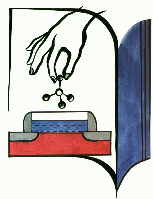 |
|||||
|
Home Nano & Giga 2002 |
|||||
|
Nano & Giga 2004 Web Site |
|||||
|
SWN2003 Workshop Phoenix, AZ |
|||||
| Moscow Visitor Tips | |||||
| FAQ | |||||
| Laptop Setup Tips | |||||
| Speakers | |||||
| Sponsors | |||||
|
Purchase Book of Abstracts |
|||||
| Abstract Submission | |||||
Proceedings
|
|||||
| Instructions for Authors | |||||
| Meeting Profile | |||||
| Conference Program | |||||
|
Nano & Giga Challenges
Summer School September 10-11, 2002
|
|||||
|
Satellite Symposium
Software Development September 15-16, 2002
|
|||||
| Exposition | |||||
| Accommodations | |||||
| Food and More | |||||
| City Transportation | |||||
| Social Program | |||||
| Visa and Travel Info | |||||
| Contact Information | |||||
| Financial Aid | |||||
| Awards | |||||
| Useful Links | |||||
| For Organizers Use |
Preparing your paper using LaTeX
If you did not use LATEX before,
it may be a good time to learn it.
LaTeX is a set of convenient macros to the more general
programming language called TEX.
TeX and LaTeX were created specifically to typset scientific documents
but evolved and now support vast range of applications ranging from
linguistics to music notation. And, frankly, while there are not easy
to master, there is nothing else so flexible and powerful to compete
with this freely available software.
Elsevier provides a document class (elsart.cls) which extends and slightly modifies the default mark-up used by LaTeX. It is also very well documented in the Elsevier documents at http://www.elsevier.com/locate/latex. Templates and examples of papers are available for different reference styles. Also BibTeX style files are provided.
Papers to be published in Microelectronics Engineering require small modification of the generic elsart.cls class. This is accomplished by changing the
\documentclass{elsart}
to
\documentclass{meeauth}
and the meeths.cls document class will read in the standard
elsart.cls automatically. Using the \documentclass{meeauth}
will allow you to have a good estimate of the total page count of your paper.
For the purpose of review, you are encouraged to submit papers in the
doublespaced version using elsart. It will make it easier for
reviewers to mark their comments and corrections. Switching between
final look ( meeths.cls ) style and the review
style is tryvial, just use the
\documentclass[doublespacing]{elsart}
as the first line for doublespaced version and
\documentclass{meeauth}
for final volume estimate. If you do not have privileges to install
documentclass files (meeths.cls and elsart.cls)
in the default TeX/LaTeX location on your computer, you can always place
them in the same directory in which you keep the document to be worked on.
The location of important files and examples is given below:
- meeauth.txt -- short documentation on how to use
the documentclass for the journal,
- meeauth.cls -- document class which slightly
modifies the standard Elsevier Science document class:
elsart.cls file (you need it too!!!).
The markup in your document will be exactly the same as for the popular
elsart style used with Elsevier journals,
- Extensive documentation on how to prepare LATEX
documents for publishing with Elsevier is available from:
http://www.elsevier.com/locate/latex.
If you are not comfortable with LaTeX, organizers will help you to convert your manuscript to the form required.